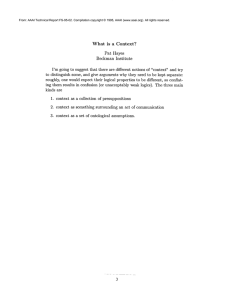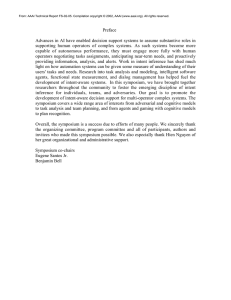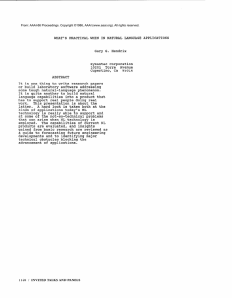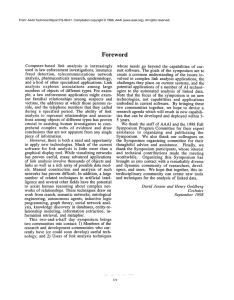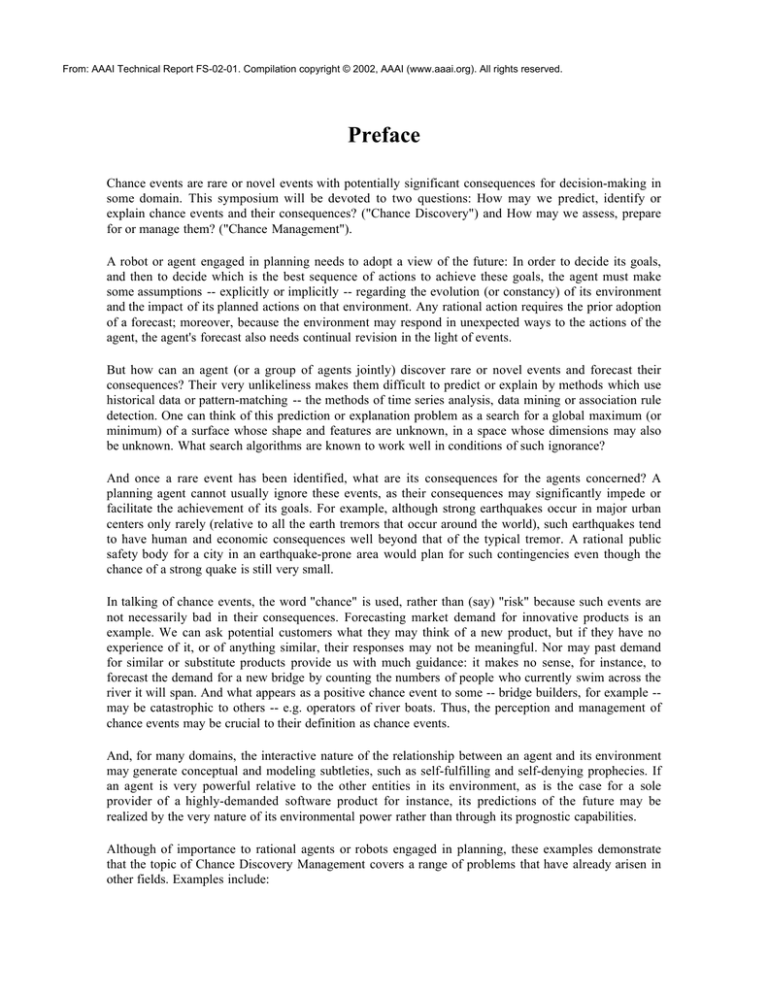
From: AAAI Technical Report FS-02-01. Compilation copyright © 2002, AAAI (www.aaai.org). All rights reserved.
Preface
Chance events are rare or novel events with potentially significant consequences for decision-making in
some domain. This symposium will be devoted to two questions: How may we predict, identify or
explain chance events and their consequences? ("Chance Discovery") and How may we assess, prepare
for or manage them? ("Chance Management").
A robot or agent engaged in planning needs to adopt a view of the future: In order to decide its goals,
and then to decide which is the best sequence of actions to achieve these goals, the agent must make
some assumptions -- explicitly or implicitly -- regarding the evolution (or constancy) of its environment
and the impact of its planned actions on that environment. Any rational action requires the prior adoption
of a forecast; moreover, because the environment may respond in unexpected ways to the actions of the
agent, the agent's forecast also needs continual revision in the light of events.
But how can an agent (or a group of agents jointly) discover rare or novel events and forecast their
consequences? Their very unlikeliness makes them difficult to predict or explain by methods which use
historical data or pattern-matching -- the methods of time series analysis, data mining or association rule
detection. One can think of this prediction or explanation problem as a search for a global maximum (or
minimum) of a surface whose shape and features are unknown, in a space whose dimensions may also
be unknown. What search algorithms are known to work well in conditions of such ignorance?
And once a rare event has been identified, what are its consequences for the agents concerned? A
planning agent cannot usually ignore these events, as their consequences may significantly impede or
facilitate the achievement of its goals. For example, although strong earthquakes occur in major urban
centers only rarely (relative to all the earth tremors that occur around the world), such earthquakes tend
to have human and economic consequences well beyond that of the typical tremor. A rational public
safety body for a city in an earthquake-prone area would plan for such contingencies even though the
chance of a strong quake is still very small.
In talking of chance events, the word "chance" is used, rather than (say) "risk" because such events are
not necessarily bad in their consequences. Forecasting market demand for innovative products is an
example. We can ask potential customers what they may think of a new product, but if they have no
experience of it, or of anything similar, their responses may not be meaningful. Nor may past demand
for similar or substitute products provide us with much guidance: it makes no sense, for instance, to
forecast the demand for a new bridge by counting the numbers of people who currently swim across the
river it will span. And what appears as a positive chance event to some -- bridge builders, for example -may be catastrophic to others -- e.g. operators of river boats. Thus, the perception and management of
chance events may be crucial to their definition as chance events.
And, for many domains, the interactive nature of the relationship between an agent and its environment
may generate conceptual and modeling subtleties, such as self-fulfilling and self-denying prophecies. If
an agent is very powerful relative to the other entities in its environment, as is the case for a sole
provider of a highly-demanded software product for instance, its predictions of the future may be
realized by the very nature of its environmental power rather than through its prognostic capabilities.
Although of importance to rational agents or robots engaged in planning, these examples demonstrate
that the topic of Chance Discovery Management covers a range of problems that have already arisen in
other fields. Examples include:
(a) demand forecasting for what marketers call "really new products";
(b) opportunity identification in business and marketing;
(c) hypothesis discovery in scientific theories;
(d) risk assessment and management in systems engineering, in environmental
management and in medicine;
(e) natural disaster prediction and management in public safety;
(f) identification of emergent behavior in systems of agents; and
(g) the relationships between individual agents and the system in complex systems
However, the subject of Chance Discovery/Chance Management is not only concerned with the
techniques used in particular domains, but also with the overall relationship of an agent with its
environment as the two, working jointly, discover and manage chance events. This holistic focus on the
agent and its environment as one, interacting, system is another point of difference between the domain
of Chance Discovery/Management and traditional approaches to forecasting or pattern matching.
This AAAI symposium will seek to bring together members of the AI community with people
from various application domains to share methods and approaches to this set of problems. Because
many of the techniques in risk analysis, demand forecasting, etc, were first developed by applied
practitioners in industry and government, it is proposed also to seek involvement from these professional
communities, in addition to the respective academic communities. The expressions of interest we have
already received for the symposium indicate the wide range of interest in these ideas, across several
disciplines.
Moreover, as well as the sharing of approaches from different disciplines, it is hoped that the
Symposium will encourage and facilitate alternative formalizations of the problems of Chance
Discovery/Management and their possible solution. Formal methods of prediction and management of
rare events will be required if these techniques are to be adopted by planning agents and robots acting in
the world. Because our interest concerns the relationship between an agent and its environment, research
in human-computer interaction (HCI) may also be relevant, since the design of an interface may
facilitate (or inhibit) the discovery and management of chance events.
Because this a new and multi-disciplinary domain, no regular conferences or meetings devoted to it yet
exist, although ad-hoc sessions on chance discovery have been held in association with other
international conferences.
Organizers:
Yukio Ohsawa (osawa@gssm.otsuka.tsukuba.ac.jp)
University of Tsukuba and
PRESTO, Japan Science and Technology Corporation
Simon Parsons (s.d.parsons@csc.liv.ac.uk)
Massachusetts Institute of Technology and
University of Liverpool
Peter McBurney (p.j.mcburney@csc.liv.ac.uk)
University of Liverpool
AAAI Fall Symposium on
Chance Discovery: The Discovery and
Management of Chance Events
Program
Friday, November 15, 2002
09:15-09:30 Opening and Welcome
09:30-10:30 Introduction to Chance Discovery and Chance Management:
we did, what we should, what we can
GSBS, Univ. of Tsukuba and PRESTO, Japan Science and Technology Corp
What
Yukio Ohsawa,
COFFEE BREAK
11:00-12:00 Invited Lecture and Discussion:
Professor Eric von Hippel, Innovation Management, Sloan School of Management,
Institute of Technology (MIT), USA.
by
Massachusetts
12:00-12:30 Session 1: Data-mining and Text-mining Approach to Chance Discovery
•
Finding the Meaning of Clusters
Yutaka Matsuo, Advanced Institute of Sciences and Technology (AIST), Japan
Yukio Ohsawa, Univ. of Tsukuba and PRESTO, Japan Science and Technology Corporation.
LUNCH
14:00-15:30 Session 1: continuing
•
•
•
Detection of Chance Events, Real-time Processing of High-dimensional Streaming Data, and
Datamining
H.M. Hubey, Department of Computer Science, Montclair State University, USA.
Finding Chance in Multi-lingual Translation Site
Akinori Abe, Chen Kak Toong, Masashi Nakamura, Mitsuo Tuskada and Hiroshi Kotera,
NTT Computer Science Laboratory, Japan and Malaysia.
PAI: Automatic Indexing for Extracting Asserted Keywords from a Document
Naohiro Matsumura, PRESTO Japan Science and Technology Corporation (JST) and University of
Tokyo, Japan
Yukio Ohsawa, PRESTO JST and University of Tsukuba, Japan
Mitsuru Ishizuka, University of Tokyo, Japan.
COFFEE BREAK
16:00-17:30 Session 2: Chance Perception and Its Aid
•
•
•
Modeling the Process of Chance Discovery by Chance Discovery on Double Helix
Yukio Ohsawa, University of Tsukuba, Japan
Yumiko Nara, Osaka Kyoiku University, Japan.
S-Conart: Concept Articulator for Shoppers
Hiroko Shoji, Mikihiko Mori and Koichi Hori,
Department of Advanced Interdisciplinary Studies, RCAST, University of Tokyo, Japan.
Managing Risks in Development of Large and Complex Systems by Knowledge Recycling
Yoshikiyo Kato, RCAST, University of Tokyo, Japan
Takahiro Shirakawa and Kohei Taketa, Department of Aeronautics and Astronautics, University of
Tokyo, Japan
Koichi Hori, RCAST, University of Tokyo, Japan.
18:00-19:00 AAAI Cocktail Reception
Saturday, November 16, 2002
09:30-10:30
•
•
Programming for Serendipity
Jose Campos and Antonio Dias de Figueiredo,
Escola Superior de Tecnologia de Viseu, Portugal.
An Approach to a Knowledge Reconstruction Engine for Supporting Event Planning
Shigeki Amitani, Mikihiko Mori and Koichi Hori,
Research Center for Advanced Science and Technology (RCAST), University of Tokyo, Japan.
COFFEE BREAK
11:00-12:00 Invited Lecture by
Dr Nassim Nicholas Taleb, Founder and Chairman, Empirica LLC, and author of: "Fooled by Randomess:
The Hidden Role of Chance in the Markets and Life."
LUNCH
14:00-15:30 Session 3: Theories of Uncertainty and its Perception
•
•
Dealing with TRACS: The Game of Confidence and Consequence
Kevin Burns, The MITRE Corporation, MA, USA.
Possibility Theory in the Management of Chance Discovery
Ronald R. Yager, Machine Intelligence Institute, Iona College, NY, USA.
•
Creative and Evaluative Processes in Conversations about Potential Events
David Bergner, NASA Ames Research Center and Stanford University, USA.
COFFEE BREAK
16:00-16:30
•
Slinky Analogy For Panassociative Functions In a HOP Model
Ronald Blue.
16:30-17:30 Panel Session: Is forecasting harder than it used to be?
18:00-19:00 AAAI Plenary Session
Sunday, November 17, 2002
9:30-10:30 Session 4: Risk and Change Management
•
•
Helping the "Other Victims" of September 11th, 2001: Gander's EOCs Manage 6,600 Diverted
Passengers
Joseph Scanlon, Emergency Communications Research Unit, Carleton University, Ottawa, Canada.
Software Requirements Acquired Through Human-Centric Chance Discovery
Mayumi Kamata, University of Tokyo and IBM Japan, Japan.
COFFEE BREAK
11:00-11:30 Session 4: Risk and Change Management, continuing
•
Chance Discovery in Emergent Systems
Alesh Kubik, Silesian University, Opava, Czech Republic.
11:30-12:30 Panel Session: What next for Chance Discovery and Chance Management?
CLOSE OF SYMPOSIUM


